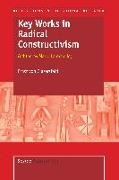Read more
Key works on radical constructivism brings together a number of essays by Ernst von Glasersfeld that illustrate the application of a radical constructivist way of thinking in the areas of education, language, theory of knowledge, and the analysis of a few concepts that are indispensable in almost everything we think and do. Ernst von Glasersfeld's work opens a window on how we know what we know. The present work grew out of a desire to make more accessible this line of thought, to highlight its originality and consistency, and to illustrate its fecundity in the domains of cognition and learning.
The first three parts of this book contain texts by Glasersfeld that outline the constructivist approach and explicate the frequently drastic reconceptualizations he has suggested. Both the last part and the postscript consist of commentaries by Edith Ackermann, Jacques Désautels, Gérard Fourez, Leslie P. Steffe and Kenneth Tobin, scholars in the fields that Glasersfeld has been concerned with. They examine a number of critical aspects pertaining to (radical) constructivism's current and future development, often tracing out paths that warrant further exploration and reflection, in particular concerning the sociopolitical dimension of knowledge.
Key works on radical constructivism is intended as a reference book for researchers, educators, and students of education-and for anyone interested in grasping, or deepening their grasp of, radical constructivism's tenets, ambitions and concerns. Readers will discover in this collection of firsthand contributions the contours of a bold, contemporary debate about a most compelling current of thought.
Ernst von Glasersfeld was brought up with more than one language from the very beginning. This taught him early on that the realities people think and talk about are noticeably different. He was much influenced by Silvio Ceccato, the founder of the Operational School in Italy, and then by Jean Piaget's Genetic epistemology, to which, he believes, he was able to add some details. He worked as a language analyst at the Center for Cybernetics in Milan, directed a language research project for the Us Air Force from 1962 to 1970, and then taught as professor of cognitive psychology at the University of Georgia, USA. In 1987 he retired at the age of 75 and became Research Associate at the Scientific Reasoning Research Institute of the University of Massachusetts. Throughout, his main interest was how we come to know what we know and how thought and language are linked. He has published several books in English, German, and Italian.
Marie Larochelle is Full Professor at the Faculty of Education of Université Laval, Québec City. For many years, she has actively researched socioepistemological problems related to the teaching/learning of scientific knowledge. Her publications have been primarily in the fields of science education and constructivism. Her current research interests focus on how students and future science teachers figure or represent the conflicts, controversies, negotiations and socioethical issues that shape the practice of the technosciences.

